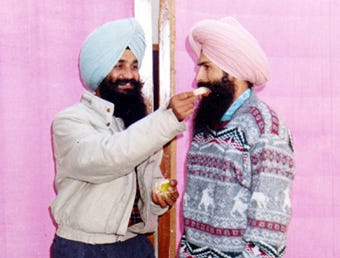Remembering Shaheeds Bhai Sukha-Jinda: Reflecting on Twenty Years of Struggle
Paramjit Singh Gazi | @psgazi
I first came into contact with sevadars of the Sikh Students Federation (SSF) when I began studying law at Punjabi University Patiala in 2002. At that time, Bhai Sewak Singh was the Convenor of the Ad Hoc Committee and Bhai Jaspal Singh Manjhphur was the head of the Punjabi University Patiala unit. With their encouragement, I attended my first panthic smagam that year—Shaheed Bhai Sukhdev Singh Sukha and Bhai Harjinder Singh Jinda’s shaheedi diharra.

At that time, the impacts of police and state terror were still fresh in people’s minds and only a handful of fortunate souls would attend events like these that openly celebrated the Sikh sangarsh. Starting from Jandiala Guru, police checkpoints were setup at every turn towards Bhai Jinda’s village, Gadhli, with heavy deployment at the location of the smagam itself.
With Bhai Daljit Singh jee’s guidance, our federation unit took a bus full of students to attend and we watched a film based on the life of Libyan revolutionary, Omar Mukhtar, during the drive. A number of students from Damdami Taksal also attended the smagam that year. In subsequent years, the sangat gradually increased as did my involvement in the federation. A few years later, we printed Shaheed Bhai Sukha-Jinda’s letter to the president in a pamphlet titled Fansi de Takhte To (“From the Gallows”) which we distributed amongst students on university campuses across Punjab, alongside the monthly Sikh Shahadat magazine.
The magazine particularly created a lot of excitement in Panthic circles in the early 2000s as it featured analysis of current events from a Panthic perspective, key philosophical and political texts related to the Sikh struggle, as well as letters written by Sikh political prisoners and the biographies of shaheeds of the armed struggle. In 2009, a major police crackdown resulted in a raid of the editorial office, confiscation of print and digital content (including original interviews with survivors of June 1984), and the arrests and interrogation of SSF activists. The magazine was shut down shortly after this.
We had also established the Sikh Siyasat News Network earlier in 2006 as a supplementary platform that would offer news and analysis from a Panthic perspective–online rather than in print. In October 2015—after the Bargadi beadbi and Saka Behbal Kalan, India’s Information and Technology Ministry sent us a complaint notice regarding the website and offered an opportunity to respond. When I attended the hearing before the E-Security and Cyber Law Group on October 29, I learned that the Badal Dal-led Punjab government was behind the complaint, stating that Sikh Siyasat should be banned because we published a copy of Shaheed Bhai Sukha-Jinda’s letter on our website that year. I argued that this was a public document of historic importance—and already widely available online.
Although the committee initially agreed and did not act on the complaint at the time, our websites were ultimately blocked in India without any notice in June 2020—censorship which has continued ever since. Since its founding in 2006, Sikh Siyasat had grown into a platform hosting four separate bilingual websites, a Facebook page with over 200,000 followers, dozens of specific videos published on our YouTube channel, and over 100,000 original news reports, articles, and editorials produced by the Sikh Siyasat team—all offering unique analysis and reporting from a distinct Panthic perspective. Since the blocking, this content is no longer accessible from anywhere in India.
Despite these constantly evolving challenges and shifting means of repression over the past twenty years, Shaheeds Bhai Sukha-Jinda continue to provide the inspiration to steadfastly work towards their ultimate goal. At a recent shaheedi smagam organized by students at Punjabi University Patiala, Bhai Jaspal Singh Manjhpur reflected on their shahadat and the guidance they provide for the next generation of Sikh activists. Drenched in love for Guru Granth and Guru Panth, Sikh naujawan will continue on this path with determination and resilience–guided by Panthic traditions and values to implement the Guru’s vision of Begampura-Halemi Raj.
Parnaam Shaheedan Nu!
Parmjeet Singh Gazi emerged as a student leader who helped revive the Sikh Students Federation immediately following the Indian state’s brutal counterinsurgency. As an investigative journalist and editor of the Sikh Siyasat media platform, his work has been heavily influential on Panthic politics and sociopolitical issues in Punjab. Parmjeet Singh is also a legal scholar with expertise on the law of genocide, a documentary filmmaker, an environmentalist, and a grassroots Sikh activist for the past 20 years. You can follow and support his work via Twitter: @psgazi @sikhsiyasat @aecpunjab
